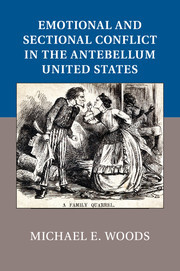The sectional conflict over slavery in the United States was not only a clash between labour systems and political ideologies but also a viscerally felt part of the lives of antebellum Americans. This book contributes to the growing field of emotions history by exploring how specific emotions shaped Americans' perceptions of, and responses to, the sectional conflict in order to explain why it culminated in disunion and war. Emotions from indignation to jealousy were inextricably embedded in antebellum understandings of morality, citizenship, and political affiliation. Their arousal in the context of political debates encouraged Northerners and Southerners alike to identify with antagonistic sectional communities and to view the conflicts between them as worth fighting over. Michael E. Woods synthesizes two schools of thought on Civil War causation: the fundamentalist, which foregrounds deep-rooted economic, cultural, and political conflict, and the revisionist, which stresses contingency, individual agency, and collective passion.




